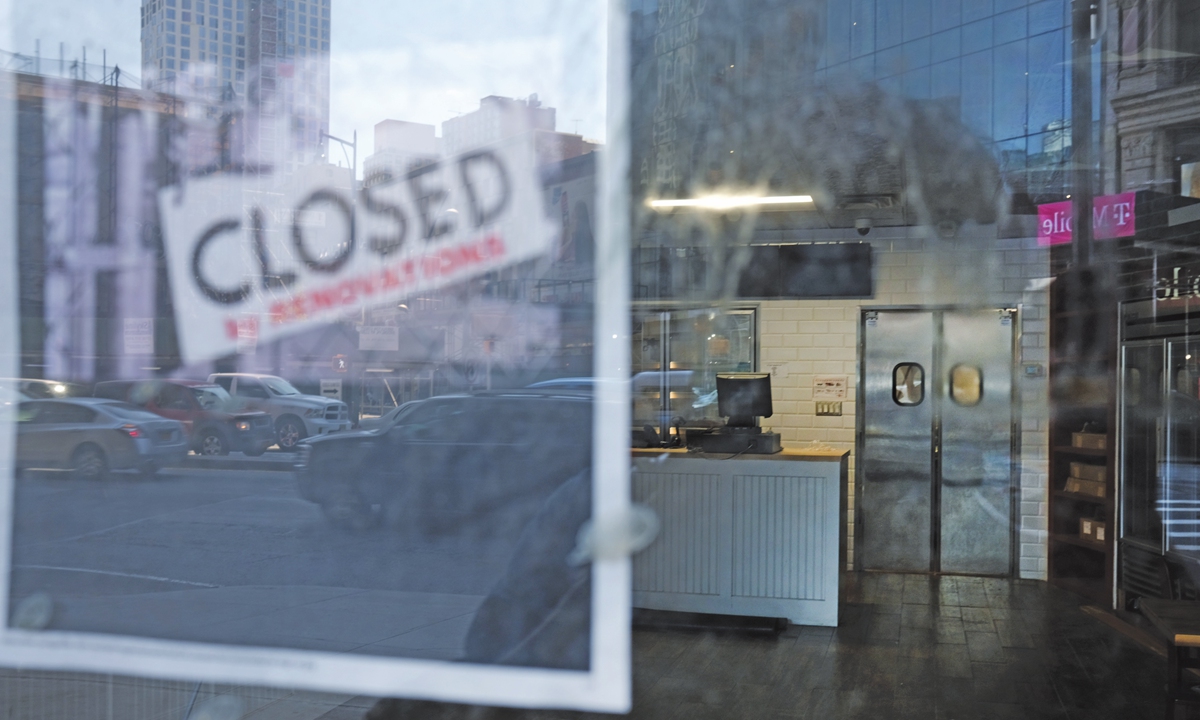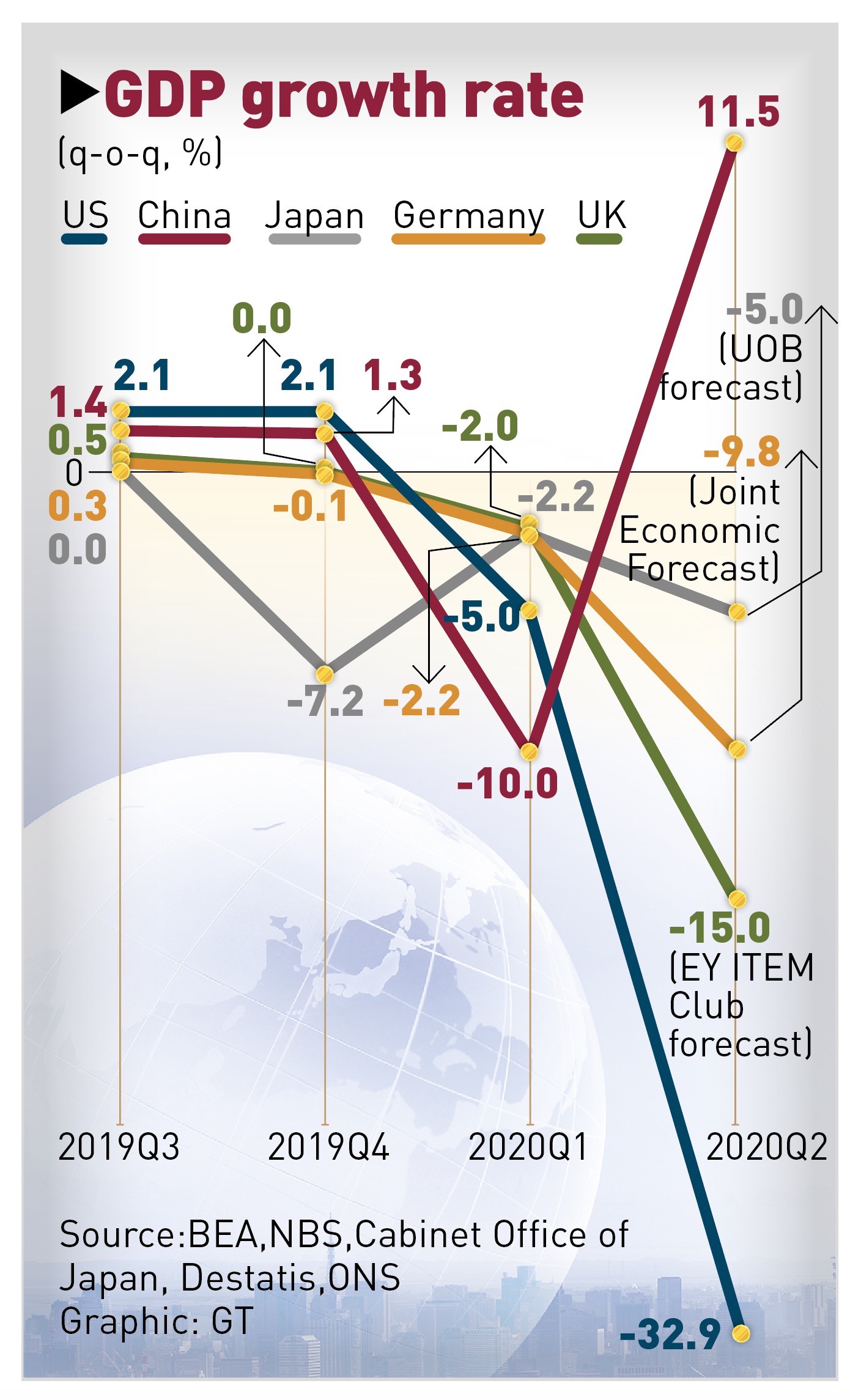US economy suffers record Q2 decline amid pandemic, ‘vaccine only hope for recovery’
By GT staff reporters Source: Global Times Published: 2020/7/30 21:25:16 Last Updated: 2020/7/30 22:45:16
Only hope for economic recovery is a vaccine: Chinese economist

A shuttered business is shown on July 21, in the Brooklyn borough of New York City, the US. Photo: AFP
Some top US officials have claimed China poses the biggest threat to the US economy, but it was the novel coronavirus and the US government's botched response that actually brought the world's largest economy to its knees, which on Thursday registered its worst GDP decline on record in the second quarter of the year, casting another dark cloud over the world economy's nascent recovery from the global COVID-19 pandemic.What's more worrisome is that the worst might not be over for the US economy, as the deadly virus continues to ravage US states and US policymakers' hands are tied given insufficient room for monetary and fiscal stimulus due to near zero interest rates and partisan fights, analysts noted. In fact, the only hope for the US and President Donald Trump for an economic recovery is that a vaccine for the virus will be miraculously developed within the next few months, an economist said.
Even that might do little to help Trump's reportedly troublesome reelection campaign, given that there are less than 100 days left before the election, experts said, warning that out of desperation, the US president could further turn to his "China card" and step up attacks on China to appeal to anti-China sentiment in the US, especially as China shows strong signs of recovery.

Graphic: GT
Worst quarter
The US Bureau of Economic Analysis (BEA) said on Thursday night Beijing time that the US economy shrank an annualized 32.9 percent in the second quarter, marking its worst quarterly fall since the BEA started keeping quarterly records in 1947, and much worse than the decline during the 2008 global financial crisis. Real GDP declined by 5 percent in the first quarter, the BEA said. The record GDP plunge in the US once again shed light on the unprecedented perils the COVID-19 pandemic has brought upon the world economy, as consumers were trapped at home, businesses were forced to shut and global trade came to a near standstill.
In Germany, the world's fourth-largest economy, also reported a record fall of 10.1 percent in economic output in the second quarter of 2020, while Japan, the world's third-largest economy, is expected to contract by an annualized 21.7 percent in the second quarter - its worst quarter since World War II, according to the Nikkei Asian Review.
Among the major economies, China was the first to record a GDP growth in the second quarter at 3.2 percent year-on-year, following a record decline of 6.8 percent in the first quarter. In another stark comparison, China's second quarter GDP grew by 11.5 percent from the first quarter.
"The biggest difference between the US and other major economies, including China, is that the US is still far away from even beginning to recover from the pandemic, while the others are moving ahead in their recovery trajectories despite lingering risks and challenges from the virus," Cao Heping, a professor of economics at Peking University, told the Global Times on Thursday.
"In fact, the only hope for the US and Trump for an economic rebound is that a miracle vaccine will be developed and used soon," Cao said, noting that the US continues to show no ability to contain the virus and there were no other effective monetary and fiscal tools left for policymakers.
On Wednesday alone, the US saw more than 63,000 new infection cases, bringing total cases to over 4.5 million - the most in the world. Meanwhile, US interest rates are at a near zero and US lawmakers are still fighting over a new relief package and are reportedly unlikely to come up with a plan before Friday when the previous relief package is due to expire.
The link between the prospects of the US economy and the epidemic was also laid bare by the Federal Reserve (Fed) before the release of the data.
"The path of the economy will depend significantly on the course of the virus," the Fed's key policy committee said in a statement on Wednesday.
Apart from the epidemic, a confluence of crises, including persistent social unrest over the police treatment of African Americans, skyrocketing unemployment and expected business closures, paint an even darker picture for the US in the third and fourth quarter, said Angelo Giuliano, a Hong Kong-based financial consultant.
"I personally don't see much improvement in [the third quarter and fourth quarter]," Giuliano told the Global Times on Thursday.
Some US officials had expected to see "the fastest-growing quarter in US history" in the third quarter, but in light of the resurgence of COVID-19, some forecasts predict US GDP could fall by the annualized 25 percent in the third quarter. For the whole year, the US GDP could shrink by 8 percent compared to a 1 percent expansion in China, according to the IMF.
Trouble for Trump

The Manhattan skyline is visible in the distance as a man visits Governors Island in New York City, the US. Photo: AFP
The record decline in the second quarter and the extraordinarily pessimistic outlook for the third quarter and beyond pose serious trouble for Trump's reelection bid, as time is running out for the US president with the election just about three months away, Chinese experts said."Trump is now facing relatively complicated prospects for reelection. Before the epidemic spiraled out of control, Trump almost seemed certain to be reelected, but the economy, which has been sacrificed in the out-of-control epidemic, and racial issues show Trump's lack of leadership," Li Yong, deputy chairman of the Expert Committee of the China Association of International Trade, told the Global Times on Thursday.
The economy has been a strong election selling point for the Trump campaign, who had been pointing to strong US economic indicators from the stock market to job creation before the pandemic. Even in the beginning of this year, Trump's approval rating regarding the economy was at its strongest level, averaging 56 percent, according to CNN. But now that advantage may have dissipated, CNN reported.
More than just his mishandling of the economy during the pandemic, the record GDP decline on Thursday could also be viewed as a direct rejection of Trump's anti-free trade, anti-globalization economic agenda marked by his trade wars with China and other major economies, Chinese experts noted. The trade war may have further crushed the US economy compared with the sudden shock caused by the pandemic, the experts added.
"Trade tensions between China and the US certainly have a relatively huge impact on production and consumption in the US," Gao Lingyun, a trade expert at the Chinese Academy of Social Sciences, told the Global Times on Thursday.
But instead of taking concrete measures to contain the virus and help the economy, Trump, out of desperation, may step up attacks on China over the next three months to deflect attention away from his failed domestic and foreign policies, Chinese experts warned.
"In the next few months, it is highly likely that the Trump administration will play its political card and the 'China card,'" Li said, adding that the US administration is so "erratic" that it could ignore the risk of a war and sacrifice the interest of Americans to create further tension in the China-US relationship.
Another factor that makes China a popular target is China's success in handling the virus and its quick catch-up to the US in total GDP, Cao said, noting that at the current pace, China's total GDP could even surpass or get close to that of the US in purchasing-power-parity (PPP) terms by the end of this year.
"Whatever the US might or might not do over the next few months, the most important thing for China is that we have to make sure our economy continues to recover," Cao said.
Newspaper headline: US suffers record GDP decline amid pandemic
Posted in: ECONOMY